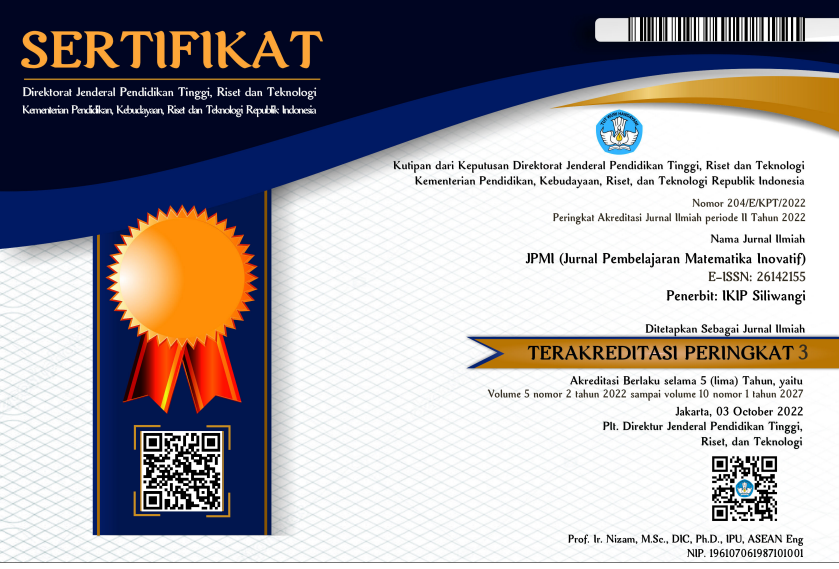Dampak model problem based learning pada kemampuan pemecahan masalah matematis
DOI:
https://doi.org/10.22460/jpmi.v7i3.24669Keywords:
Model problem-based learning, Mathematical Problem SolvingAbstract
The motivation behind this investigation was the weak performance of children in math problems. The purpose of this study is to determine the impact of problem-based learning model on improving students' ability to solve mathematical problems. This study utilized a quasi-experiment method with a Nonequivalent Control Group design. The subjects in this study were class VII B as the experimental group and class VII C as the control group. Each of the two classes had thirty-five students. The purpose of using a control group as a comparison is to observe what symptoms appear in the group of participants who receive treatment. The conclusion shows that the Problem Based Learning model has a significant impact on the average N-Gain score based on the variation between the pretest score and the final score, namely the posttest score, where the average N-Gain score of the experimental and control classes is significantly different.
References
Bernard, M., Nurmala, N., Mariam, S., & Rustyani, N. (2018). Analisis kemampuan pemecahan masalah matematis siswa SMP kelas IX pada materi bangun datar. SJME (Supremum Journal of Mathematics Education), 2, 77–83.
Jufrin, J., Isa, D. R., Nurwan, Majid, Bito, N., & Zakiah, S. (2023). Meningkatkan kemampuan pemecahan masalah matematika melalui model problem based learning materi operasi bentuk aljabar. Innovative: Journal of Social Science Research, 3, 12145–12154. http://j-innovative.org/index.php/Innovative/article/view/1838%0Ahttps://j-innovative.org/index.php/Innovative/article/download/1838/1351
Kodariyati, L., & Astuti, B. (2016). Pengaruh model PBL terhadap kemampuan komunikasi dan pemecahan masalah matematika siswa kelas V SD. Jurnal Prima Edukasia, 4(1). https://doi.org/10.21831/jpe.v4i1.7713
Malikha, D. R. (2018). Strategi pembelajaran PBL (problem based learning) sebagai salah satu metode pembelajaran berkarakter dan berwawasan global. National Seminar on Education and Citizenship IV, 88–89. http://seminar.umpo.ac.id/index.php/SEMNASPPKN/article/view/162
Mubarok, M. U., Zahroh, U., Tadris Matematika, J., & Tulungagung, I. (2018). Pengembangan media pembelajaran matematika dengan power point VBA pada materi sistem persamaan linear tiga variabel. Prosiding SI MaNIs (Seminar Nasional Integrasi Matematika Dan Nilai-Nilai Islami), 2(1).
Murni, V., Dewi, R., Jehadus, E., & Sugiarti, L. (2021). Hubungan antara minat belajar dengan resiliensi matematis pada masa pandemi COVID-19. Jurnal Cendekia : Jurnal Pendidikan Matematika, 5(2). https://doi.org/10.31004/cendekia.v5i2.546
Ngaeni. (2017). Menciptakan pembelajaran matematika yang efektif dalam pemecahan masalah matematika dengan model pembelajaran problem posing. Aksioma, 6(2), 294–310. https://doi.org/10.1093/oseo/instance.00168151
Rahmawati, D., Fitrianna, A. Y., & Afrilianto, M. (2022). Penerapan model PBL terhadap kemampuan pemecahan masalah matematis siswa SMP kelas VII pada materi himpunan. Jurnal Pembelajaran Matematika Inovatif, 5(6), 1725–1734. https://doi.org/10.22460/jpmi.v5i6.1725-1734
Rerung, N., Sinon, I. L. ., & Widyaningsih, S. W. (2017). Penerapan model pembelajaran problem based learning (PBL) untuk meningkatkan hasil belajar peserta didik SMA pada materi usaha dan energi. Jurnal Ilmiah Pendidikan Fisika Al-Biruni, 6(1). https://doi.org/10.24042/jpifalbiruni.v6i1.597
Reski, N. (2021). Tingkat minat belajar siswa kelas IX SMPN 11 Kota Sungai Penuh. Jurnal Inovasi Penelitian, 1(11).
Reski, R., Hutapea, N., & Saragih, S. (2019). Peranan model problem based learning (PBL) terhadap kemampuan pemecahan masalah matematis dan kemandirian belajar siswa. JURING (Journal for Research in Mathematics Learning), 2(1), 049. https://doi.org/10.24014/juring.v2i1.5360
Rezkillah, I. I., & Haryanto, H. (2020). Pengaruh model pembelajaran problem based learning terintegrasi high order thinking skill terhadap kemampuan berpikir kritis dan sikap percaya diri. Jurnal Pendidikan Sains Indonesia, 8(2). https://doi.org/10.24815/jpsi.v8i2.17322
Sugiyono, S. (2016). Metode penelitian kuantitatif, kualitatif, R&D. Bandung: Alfabeta.
Susino, S. A., Destiniar, D., & Sari, E. F. P. (2023). Pengaruh model pembelajaran problem based learning (PBL) terhadap kemampuan pemecahan masalah matematis siswa kelas X SMA. Jurnal Cendekia : Jurnal Pendidikan Matematika, 8(1). https://doi.org/10.31004/cendekia.v8i1.2918
Yulianti, E., & Gunawan, I. (2019). Model pembelajaran problem based learning (PBL): efeknya terhadap pemahaman konsep dan berpikir kritis. Indonesian Journal of Science and Mathematics Education, 2(3). https://doi.org/10.24042/ijsme.v2i3.4366
Zaozah, E. S., Maulana, M., & Djuanda, D. (2015). Kemampuan pemecahan masalah dan disposisi matematis siswa menggunakan pendekatan problem-based learning. Jurnal Pena Ilmiah, 781–790.
Downloads
Published
Issue
Section
License

This work is licensed under a Creative Commons Attribution-ShareAlike 4.0 International License.
The author is responsible for acquiring the permission(s) to reproduce any copyrighted figures, tables, data, or text that are being used in the submitted paper. Authors should note that text quotations of more than 250 words from a published or copyrighted work will require grant of permission from the original publisher to reprint. The written permission letter(s) must be submitted together with the manuscript.
















